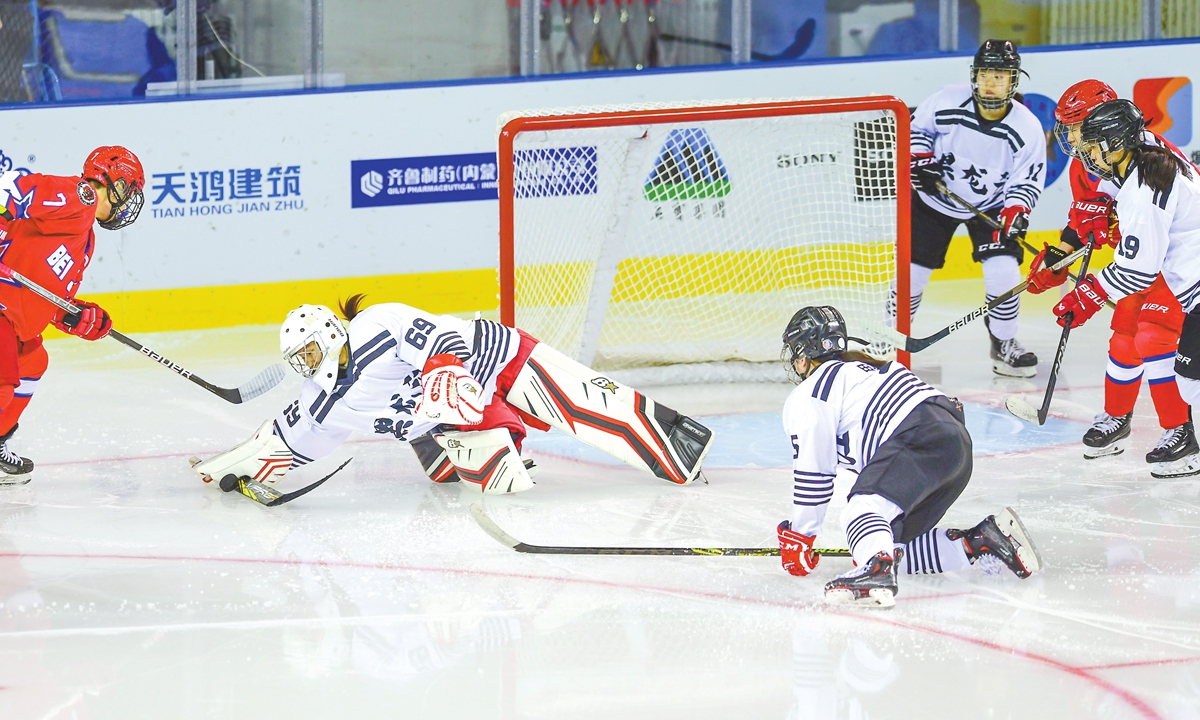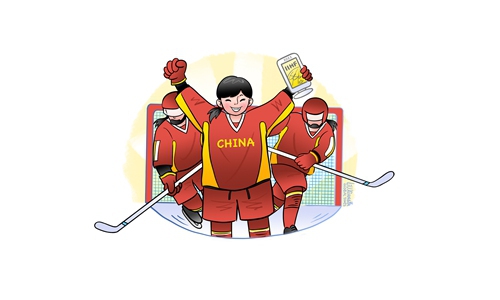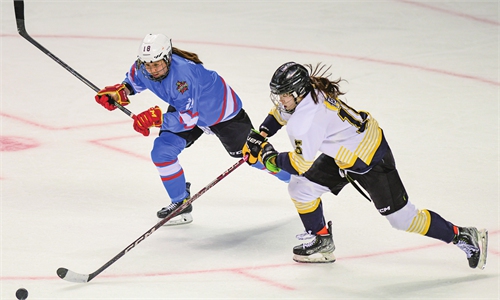SPORT / OLYMPICS
Women’s ice hockey league returns to China ahead of Games

Team Heilongjiang's goalie blocks a shot against Team Beijing during the 14th National Winter Games in Hulun Buir, North China's Inner Mongolia Autonomous Region in February 2024. Photo: VCG
With the conclusion of the 2024 Summer Olympic Games in Paris, France, the focus in Chinese sports has begun shifting toward winter sports, especially with the 2025 Asian Winter Games to be hosted in Harbin, Northeast China's Heilongjiang Province, just six months away and the 2026 Winter Olympics in Milan, Italy, looming on the horizon.
One of the recent notable developments is the upcoming second season of the Women's Chinese Ice Hockey League (WCIHL), which is set to commence on September 1, according to the Chinese Ice Hockey Association (CIHA).
The WCIHL, initiated in November 2023, was a milestone for Chinese women's ice hockey, as historically China's women's ice hockey has faced challenges due to limited exposure and opportunities for domestic players.
"The teams participating in the inaugural season gained valuable experience through 71 matches, significantly improving their overall competitive level," Wang Xuan, head of the CIHA, told a news conference on Wednesday. "This has made an outstanding contribution to the cultivation of talent, and the professional development of teams and clubs."
Previously, a women's ice hockey club that featured mainly the Chinese national team's players relied on competing in the Kontinental Hockey League (KHL) to hone the players' skills.
Now the domestic league is poised to play a significant role in enhancing the level of competition within China and ensuring a steady pipeline of talent for the national team.
Li Yutian, a senior official with the CIHA, told reporters that although the Chinese women's ice hockey team was unable to maintain its position in the top tier during the year 2024's Women's Ice Hockey World Championship, they still demonstrated strong competitiveness.
The women's national team has a tight schedule in the lead-up to 2026, with the Asian Championship to be held in Beijing in late October, the Milan Winter Olympics qualifiers in Japan in February 2025, followed by the back-to-back Asian Winter Games at home in Harbin, Northeast China's Heilongjiang Province.
The Chinese women's ice hockey team recently completed a two-month training session. The players are expected to immediately begin preparations for the league, according to Li. With the league's regular season running till December, the national team will also participate in important events such as the Asian Championships in Beijing from late October to early November.
Ripple effect
The success of the WCIHL could also have a ripple effect on the development of ice hockey more broadly in China. Plans are already underway to launch a men's professional league later this year, further cementing the sport's growing presence in the country.
"The establishment of domestic ice hockey leagues addresses the need for a platform that could sustain and grow the sport in China," Mao Jiale, a Chengdu-based sports commentator, told the Global Times.
"The league's consistent schedule will help players refine their skills, build team chemistry, and gain valuable experience under pressure, which also provides the national team with a broader pool of talent to draw from when selecting players, ensuring that the team is well-prepared to face the world's best."
As the league grows, it is expected to not only elevate the standard of play, but also increase the visibility and popularity of ice hockey across the country.
In addition to the professional leagues, a series of grassroots initiatives are being rolled out to increase public participation in ice hockey.
These include programs such as "hockey in schools" and "hockey in communities," which aim to introduce the sport to a wider audience and inspire the next generation of players.
These efforts are part of a broader strategy to capitalize on the legacy of the Beijing 2022 Winter Olympics, which was a pivotal moment for winter sports in China.
Beijing 2022 legacy
The Beijing Games sparked a nationwide surge in interest in winter sports, with the government committing to the ambitious goal of "engaging 300 million people in winter sports."
Since then, the country has made significant strides in expanding access to winter sports facilities, increasing participation rates, and raising the profile of winter sports among the general public.
One of the most visible manifestations of this effort is the National Winter Sports Week, which was launched on August 19 in Harbin.
This event showcases a variety of winter sports activities, including off-season training methods such as roller skiing, dry-land ice hockey, and curling.
These activities not only offer fun and engaging ways for people to stay active during the warmer months, but also help maintain the momentum generated by the Beijing 2022 Winter Olympics and keep winter sports in the public eye year-round.
In addition to domestic initiatives, China's national teams are also intensifying their preparation for the upcoming international competitions.
The short-track speed skating team, for example, embarked on a 41-day summer training camp in Italy in June.
This rigorous training program is designed to fine-tune the athletes' physical conditioning, technique, and mental endurance, all of which will be crucial in the high-stakes environment of the Asian Winter Games and the 2026 Winter Olympics.
Similarly, the national freestyle skiing and snowboard cross teams have traveled to the southern hemisphere where it is currently winter to participate in international competitions to gain experience.
"These overseas training programs highlight China's commitment to leaving no stone unturned in its quest for excellence in winter sports," Mao said.
"By seeking out the best training environments and competing against top-tier international opponents, Chinese athletes are gaining the experience and confidence they need to succeed on the world stage."



